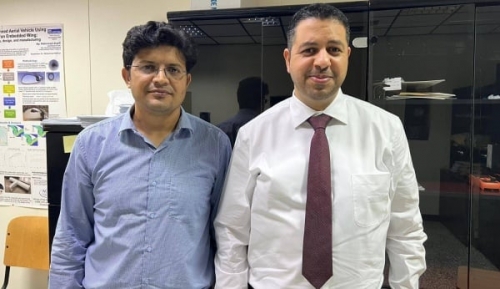A recent groundbreaking study conducted at the University of Bahrain has led to the development of an artificial intelligence (AI) model that can reduce fuel consumption during aircraft takeoff by over 10%. This innovative approach has the potential to have a significant impact on operational costs and carbon emissions within the aviation industry. Ahmed Khalil Al Owainaty, a PhD researcher in Mechanical Engineering at the university, utilized genetic algorithms, neural networks, and machine learning to optimize takeoff and landing paths for Airbus A320 aircraft.
Al Owainaty’s dissertation, titled “Optimizing Takeoff and Landing Path for Airbus A320 Aircraft Using Artificial Intelligence Techniques,” focused on exploring 17 variables to minimize fuel consumption, carbon dioxide emissions, maintenance costs, and operational costs. By incorporating AI techniques like machine learning and neural networks, the model was able to optimize takeoff and landing paths at several airports using a genetic algorithm. The experiments were conducted through virtual simulation at three airports in the region, resulting in positive outcomes.
In order to ensure the practical implementation of the genetic algorithm, the study also addressed risk assessments associated with utilizing AI technologies in optimizing takeoff and landing operations. By identifying ways to mitigate these risks and aligning with the standards set by the US Federal Aviation Administration, the impact of these risks was minimized to the lowest possible level. This approach allows for the potential adoption of the AI model in real-world scenarios while ensuring safety and efficiency.
The use of AI techniques in optimizing aircraft takeoff and landing processes has the potential to revolutionize the aviation industry by reducing fuel consumption, carbon emissions, and operational costs. This groundbreaking study conducted at the University of Bahrain showcases the power of genetic algorithms, neural networks, and machine learning in achieving significant improvements in aircraft performance. By involving virtual simulations at various airports in the region, the model was able to deliver promising results while adhering to safety standards set by regulatory authorities.
The development of an AI model that can optimize takeoff and landing paths for Airbus A320 aircraft represents a major step forward in enhancing fuel efficiency and reducing environmental impact within the aviation sector. This research, conducted by Ahmed Khalil Al Owainaty as part of his PhD dissertation, highlights the potential of artificial intelligence techniques in revolutionizing aircraft operations. By focusing on variables such as aircraft weight, temperature, wind speed, and airport runway elevation, the model was able to identify optimal paths that minimize fuel consumption and carbon dioxide emissions.
Overall, this groundbreaking study conducted at the University of Bahrain demonstrates the potential for artificial intelligence to transform aircraft operations and contribute to a more sustainable aviation industry. By leveraging genetic algorithms, neural networks, and machine learning, researchers were able to develop an innovative AI model that can optimize takeoff and landing paths for Airbus A320 aircraft. The positive outcomes of the virtual simulations conducted at three airports in the region highlight the effectiveness of this approach in reducing fuel consumption, carbon emissions, and operational costs. With further research and development, AI technologies could play a key role in driving efficiency and environmental sustainability within the aviation sector.











